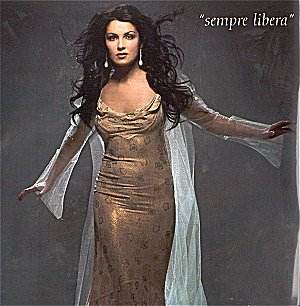Soprano phenomena have
come and gone over the last few decades.
Some have gone entirely, some have stayed
around without exactly dominating the
field as did certain names of the past.
Some of them got to record Traviatas
with elderly and distinguished maestros.
And all the while, most of the female
singers who have established themselves
over the last few years have been mezzos,
suggesting that the soprano voice, like
the tenor voice, is not so easily produced
in the modern world.
Perhaps people will
be reading this review with amazement
in ten years’ time, but I’m going to
risk it and say that I think this is
a voice that’s got what it takes. First
of all, it’s a voice with a very beautiful,
lustrous sheen on it, yet with enough
strength behind it to allow a firm musical
line in the pianissimo passages, and
for it to expand without hardness in
fortes. There is no loose, uncontrolled
vibrato (it doesn’t sound like a Slavonic
voice at all). And this is true in all
registers, lower, middle and upper.
Then, while the words are not allowed
to disrupt the musical line as they
could with Callas, we get far more of
them than we did from Sutherland. Netrebko
is certainly alive to the meaning of
what she is singing and to the colour
of the words. In all the slow cabalettas,
and particularly in the Verdi scene,
we hear that this is a voice able to
carry emotion as well as sounding lovely.
At the same time, her agility in the
fireworks which conclude the first four
pieces on the disc is apparently effortless,
allowing her to find the music behind
the flame-throwing. Netrebko herself
speaks of her great admiration of Renata
Scotto and Mirella Freni. Even before
reading this, I had been reminded of
the younger Scotto, when her voice was
as yet pure and untarnished.
Reservations? More
than a reservation, I would point out
that the dramatic outburst at the end
of the Verdi "Willow Song"
is resolved warmly rather than so as
to send shivers down you spine. The
Puccini aria, too, is resolved with
a warm, gentle tone but without the
heft of a real dramatic soprano. It
is, then, for the moment, a perfect
instrument for the bel canto repertoire.
Maybe it will acquire greater dramatic
thrust over the years but I hope Netrebko’s
admiration for Scotto will also cause
her to reflect on the not always happy
results when that singer launched into
the dramatic repertoire, with a hardening
and darkening of the tone and then a
gradual withdrawal from the scene. So
no dramatic Verdi or Puccini roles for
yet a long while, please, but lots of
Mozart, Bellini, Donizetti and Rossini,
and how about some lieder? The booklet
assures us that "she knows what
she can do and where her limitations
currently lie". Let us hope and
pray this is true. Potentially this
voice is the best soprano news since
Caballé and it would be a tragedy
if mistaken repertoire should result
in the operatic dustbin claiming yet
another victim.
Claudio Abbado is infinitely
more than an accompanist. He colours
and analyses every strand of these textures
with the same care he would give to
a Mahler symphony, revealing that Bellini
and Donizetti were actually masterly
orchestrators, not something you would
think in some other hands. I don’t know
if this is the first time the original
glass harmonica is used in place of
a flute in the Donizetti scene but it’s
the first time I’ve heard it. It adds
another dimension, sounding quite eerie
and genuinely deranged.
The booklet has some
slightly odd things to say about the
world of opera but we get full texts
and translations of the arias, which
is not something you can always take
for granted even at full price. I’ve
only heard the "normal" CD
format of the recording, but it is stunningly
good in any case (fantastic timpani
definition, for instance).
Christopher Howell


